Do you ever feel like you are constantly on the edge? Like one wrong move will send you crashing down? That is what it feels like to be experiencing emotional overwhelm. This condition can be very debilitating and often leaves people feeling paralyzed. In this article, we will explore the concept of emotional overwhelm, its symptoms. Furthermore, we will some tips for dealing with it and suggest some treatment options for recovering it.
Contents
Understanding Emotional Overwhelm
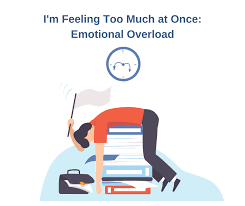
Emotional overwhelm is a condition that can be caused by experiencing too much stress or emotion in a short period. It can leave people feeling paralyzed and unable to cope. There are several different types of emotional overwhelm, each with its own set of symptoms and consequences.
Types of Emotional Overwhelm
There are three main types of emotional overwhelm: acute, episodic, and chronic.
Acute emotional overwhelm
Acute emotional overwhelm is the most common type. It is caused by stressors that are short-term and usually resolve within a few days or weeks.
Episodic emotional overwhelm
Episodic emotional overwhelm occurs when someone experiences repeated episodes of acute emotional overwhelm. It is caused by stressful events that happen over a longer period but are less intense than chronic emotional overwhelm.
Chronic emotional overwhelm
Chronic emotional overwhelm occurs when someone experiences overwhelming emotions for months or years at a time without any respite. This can be caused by long-term stressors such as illness, financial difficulties, or relationship problems.
Degrees of Emotional Overwhelm
There are also three degrees of emotional overwhelm: mild, moderate, and severe.
Mild emotional overwhelm
Mild emotional overwhelm is characterized by symptoms such as feeling overwhelmed, anxious or stressed but being able to continue with everyday life.
Moderate emotional overwhelm
Moderate emotional overwhelm is characterized by symptoms such as feeling overwhelmed, anxious, or stressed and being unable to continue with everyday life.
Severe emotional overwhelm
Severe emotional overwhelm is characterized by symptoms such as feeling overwhelmed, suicidal thoughts, self-harm, psychosis, or a breakdown.
Signs of Emotional Overwhelm
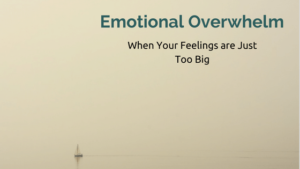
There are many signs that someone may be experiencing emotional overwhelm. However, the most common symptoms are:
Behavioral Symptoms
- Feeling overwhelmed: Feeling like you are constantly on the edge and that one wrong move will send you crashing down.
- Signs of anxiety: Feeling tense, worried, or feeling like something bad is about to happen.
- Withdrawing from friends and family: Pulling away from people who care about you or avoiding social activities.
- Sleeping problems: Having trouble falling asleep or staying asleep.
Cognitive Symptoms
- Feeling unable to cope: Feeling like you are not coping with things that happen around you or in your life.
- Poor concentration: Having trouble focusing on what needs to be done and finding it hard to complete tasks.
- Mental exhaustion: Feeling mentally exhausted from daily activities such as work, school, or other responsibilities.
Physical Symptoms
- Fatigue: Feeling tired all the time and having trouble getting out of bed in the morning.
- Muscle tension: Having tight muscles that feel sore when touched or moved around.
- Headaches: Having a headache or feeling like your head is heavy.
Other Symptoms
- Loss of appetite: Not wanting to eat or have no interest in food.
- Feeling down or depressed: Feeling sad, blue, or low for no reason at all.
- Irritability and anger: Being easily annoyed by people around you and having outbursts of anger without much provocation from others.
- Trouble swallowing: Feeling like you cannot swallow properly, often accompanied by a gagging sensation.
Risk Factors for Emotional Overwhelm

There are many different risk factors for emotional overwhelm. However, some of the most common ones include:
Having a mental health condition: People who have a diagnosed mental health condition such as depression or anxiety are more likely to experience emotional overwhelm than people without these conditions.
Experiencing traumatic events: Traumatic events like death, divorce, job loss, financial difficulties, and other major life changes can lead to emotional overwhelm.
Having a family history of mental illness: People who have parents or other close relatives with a mental health condition may be more likely to develop one themselves.
Living in a high-stress environment: People who live in fast-paced, highly demanding environments are more likely to experience emotional overwhelm.
Having poor coping skills: Some people have poor coping skills and are more likely to experience emotional overwhelm in response to stress.
Being female:: Women are twice as likely as men to experience depression, which can lead to emotional overwhelm.
Evaluating Consequences of Emotional Overwhelm
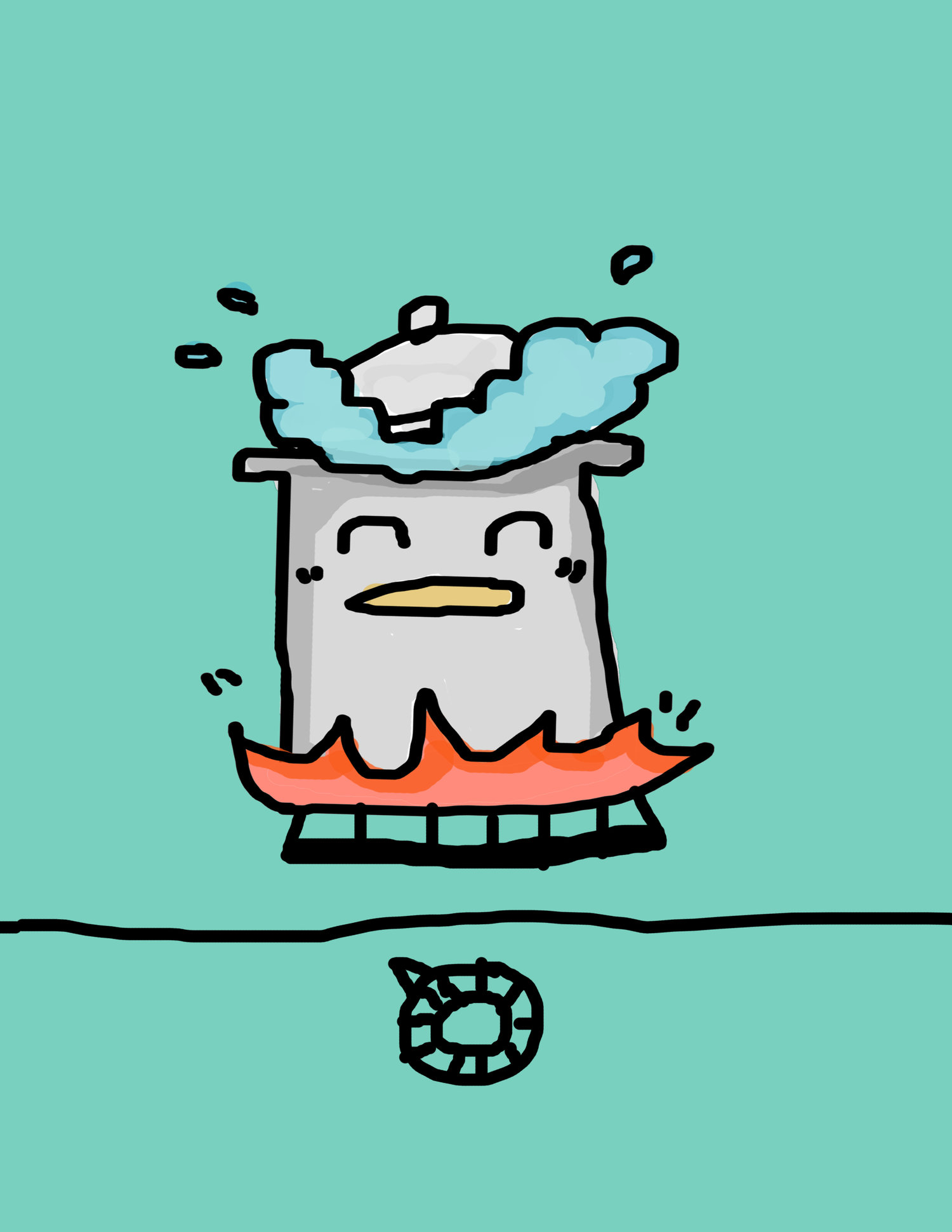
Emotional overwhelm can have several consequences on different aspects of your life and health. However, the most common consequences are:
On Personal Life
Having difficulty functioning day-to-day: People who are experiencing emotional overwhelm may find it difficult to get out of bed in the morning, go to work or school, or take care of their usual responsibilities.
Feeling isolated: People who are overwhelmed often feel like they cannot talk to anyone about what is going on and can feel isolated from friends and family.
Struggling with relationships: Relationships can be strained when one person is experiencing emotional overwhelm, as that person may be more irritable or withdrawn than usual.
Suicidal thoughts or behaviors: Thoughts of suicide and actual suicide attempts are more common in people who are experiencing emotional overwhelm.
On Work-Life
Having difficulty concentrating: People who are overwhelmed may find it difficult to focus on their work and maybe less productive than usual.
Feeling stressed and anxious: Feeling stressed and anxious can be common in people who are experiencing emotional overwhelm and can lead to job burnout.
Struggling with relationships: Relationships at work can be strained when one person is experiencing emotional overwhelm, as that person may be more irritable or withdrawn than usual.
Leaving work: People who are overwhelmed may feel like they cannot handle their job and may quit or get fired. And their work performance may suffer as a result.
On Social Life
Not wanting to see people: People who are experiencing emotional overwhelm may not want to spend time with other people, which can lead to isolation.
Feeling anti-social: Emotional overwhelm can make you feel like you cannot be around others for long periods and may lead you to feel anti-social.
Feeling anxious in social situations: It is common for people who are experiencing emotional overwhelm to feel more anxious than usual when they are around other people, including friends, family members, colleagues at work, or strangers.
On Physical Health
Sleep problems: People who are overwhelmed often have difficulty sleeping, which can lead to fatigue and other health problems.
Stress-related illnesses: People who are experiencing emotional overwhelm may be more likely to develop stress-related illnesses such as heart disease, high blood pressure, and diabetes.
Weight gain or loss: People who are overwhelmed often have a hard time eating healthy and maintaining a healthy weight. They may either lose or gain weight as a result of emotional overwhelm.
Poor immune system function: When you are feeling overwhelmed, your immune system may not work as well as it should, making you more susceptible to getting sick.
On Mental Health
Having difficulty concentrating: People may find it difficult to focus on their work and maybe less productive than usual when struggling with overwhelming episodes.
Suicidal thoughts or behaviors: Thoughts of suicide and actual suicide attempts are more common in people who are experiencing emotional overwhelm.
Mood disorders: Feelings of depression or anxiety can be common in people who are experiencing emotional overwhelm and can lead to mood disorders like major depressive disorder (MDD) or generalized anxiety disorder (GAD).
On Spiritual Health
Having difficulty praying or meditating: People who are going through overwhelming feelings may find it difficult to pray or meditate, which can lead to a loss of faith.
Feeling spiritually lost: People who feel such overwhelming feelings, often feel like they have lost their connection to something larger than themselves, which can lead to a sense of spiritual emptiness.
Feeling disconnected from God: People who are experiencing emotional overwhelm may feel that they have lost their connection to God and may feel angry at Him/Her.
Dealing With Emotional Overwhelm
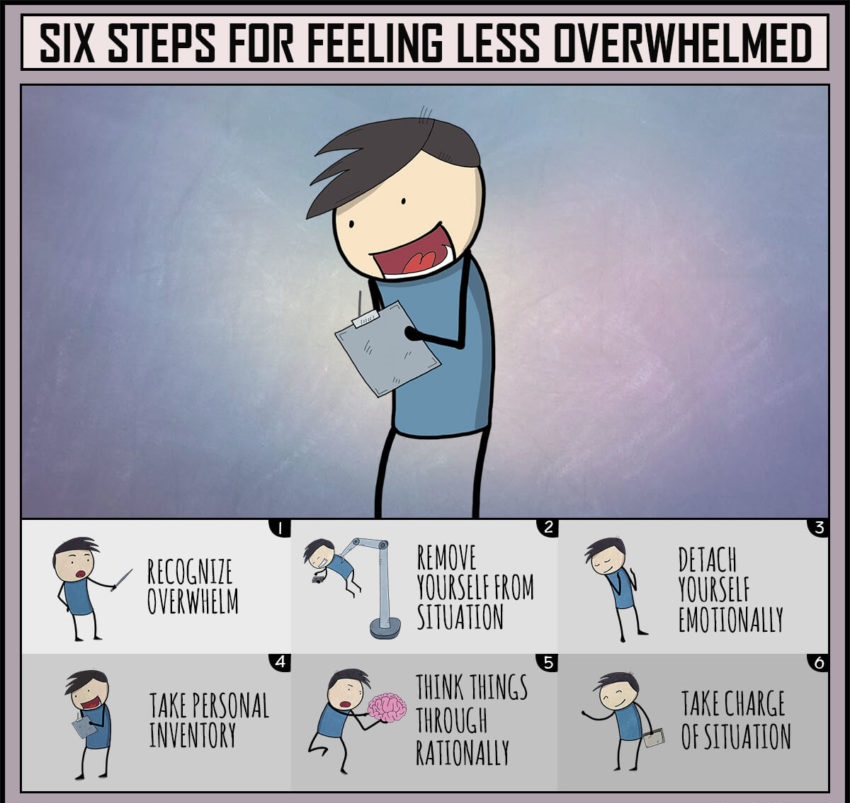
Dealing with emotional overwhelm can be difficult. But it is important to remember that you are not alone. And there are many things you can do to help yourself feel better. Moreover, here is some set of tips for dealing with emotional overwhelm:
Practical Tips
Take a break: If you are feeling overwhelmed, take a break. Go for a walk, watch TV, or take a nap.
Talk to someone: Talk to a friend, family member, or therapist about what you are going through.
Express your feelings: Expressing your feelings can help you feel better and can help you move forward. Write in a journal or talk to someone about what you are feeling.
Seek professional help: If you feel like your emotional overwhelm is too much to handle on your own, seek professional help from a therapist or counselor.
Lifestyle Tips
Eat healthily: Eat plenty of fruits and vegetables and drink lots of water.
Get enough sleep: Get at least eight hours of sleep per night.
Exercise: Exercise regularly to help release endorphins, which can improve your mood.
Take breaks: Take a break from work now and then to relax and rejuvenate yourself.
Avoid caffeine and alcohol: Caffeine and alcohol can increase your anxiety and make you feel worse.
Diet Tips
Eat whole foods: Avoid processed foods and eat more fruits, vegetables, nuts, seeds, legumes, and whole grains instead.
Drink plenty of water: Water helps your body function properly and can help you feel better overall.
Avoid alcohol: Research and studies show that alcohol increases anxiety and depression in some people, so one must avoid it as far as possible.
Avoid sugar: Sugar can cause a spike in blood glucose levels which may lead to feelings of anxiety or depression over time with its regular consumption.
Talking To a Professional
Seek professional help if you are feeling overwhelmed, it may be helpful to talk with a therapist or counselor about what you are going through. Moreover, here is a list of reasons why talking to a professional can be helpful:
You can get support: A therapist or counselor can provide you with emotional support and guidance.
Can help you understand your feelings: Talking to a professional about your feelings can help you better understand them and may lead to self-growth.
Provide a listening ear: A therapist or counselor is someone who will listen to you without judgment and will help you work through your problems.
Offer suitable treatment options: If you are struggling with overwhelming emotions, a professional may be able to offer you treatment options like therapy or medication.
It is important to find a therapist that you feel comfortable with and can work with on your goals for treatment, whether it be reducing anxiety or learning how to cope better in stressful situations.
Treatment Options
Medications are often given to people who are struggling with overwhelming emotions. But they have many side effects and can be dangerous if not taken under the supervision of a physician or psychiatrist. However, some of the side-effects are:
- Can be addictive: Medications like antidepressants and anti-anxiety medications can be addictive if taken for a long period.
- Aren’t always necessary: Some people may need medication to cope better on their own, but others might find that talking therapy alone is enough for them.
- Can have dangerous side effects: Some medications, like stimulants, can have dangerous side effects if not taken under the supervision of a physician or psychiatrist.
Therapy should always be the first line of defense. If only it doesn’t improve the symptoms, then one must resort to medications in combination with therapy.
Therapy Options
There is no “one size fits all” approach to treating emotional overwhelm. However, some therapy options that may help treat emotional overwhelm include:
Dialectical Behavior Therapy (DBT): DBT is a type of therapy that helps you learn how to regulate your emotions, tolerate stress, and improve your relationships.
Interpersonal Psychotherapy (IPT): IPT is a type of therapy that focuses on the relationship between you and others. It can be helpful for people who are struggling with issues like depression or anxiety.
Cognitive-Behavioral Therapy (CBT): CBT is a type of therapy that focuses on changing the way you think and behave. It can be helpful for people who are struggling with anxiety, depression, or other mental health issues.
Group Therapy: Group therapy is a type of psychotherapy that involves meeting with other people who have similar problems and sharing your experiences to help each other cope better. It can be helpful for people who are struggling with issues like depression or anxiety.
Medications
There are no medications specifically for treating emotional overwhelm. However, different medications may help reduce symptoms of this feeling, such as:
Antidepressants: Antidepressants are medications that are helpful to treat depression. They can be helpful for people who are struggling with overwhelming emotions.
Anti-Anxiety Medications: Anti-anxiety medications are medications that are helpful to treat anxiety. They can be helpful for people who are struggling with overwhelming emotions.
Stimulants: Stimulants are medications that are helpful to treat attention deficit hyperactivity disorder (ADHD). They can be helpful for people who are struggling with overwhelming emotions.
Supporting Someone Through It
If you have a loved one who is struggling with overwhelming emotions, there are things that you can do to help them:
Listen without judgment: Listen to your loved ones without judging them and let them know that you support them.
Offer practical help: Offer your loved one practical help, like taking care of their children or doing the grocery shopping.
Encourage them to seek help: Encourage your loved ones to seek professional help and offer to go with them to their first appointment.
Be there for them: Be there for your loved ones when they need you and let them know that you’re always available to talk.
Experts’ Opinion On Emotional Overwhelm
Some experts believe that emotional overwhelm is a mental health issue and calls for timely treatment. However, others argue that it’s not a real problem. But rather just another way of saying “I’m stressed out.”
Also, some believe that emotional overwhelm can be an outcome of many different factors including genetics, environment, and lifestyle choices. Whatever the cause, it’s important to seek help if you’re struggling with overwhelming emotions.
Brain Activity During Emotional Overwhelm
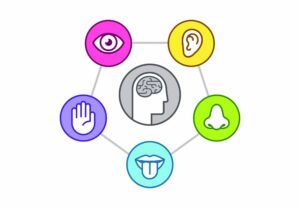
Recent research has shown that brain activity during emotional overwhelm is similar to what happens during a panic attack.
This means that when someone experiences an overwhelming emotion, their body reacts as if it is experiencing an attack by something dangerous—even though there may not be any actual threat present.
Furthermore, scientists have found that there is a “fight or flight” response in the brain when people face overwhelming emotions. Since, the amygdala which is responsible for responding to danger and fear, releases adrenaline into your bloodstream while increasing blood flow to muscles. So they can respond quickly if needed.
In addition, the hypothalamus also releases cortisol into your system. It is a hormone that helps your body deal with stress. Over time, if this response is in activation too often, it can lead to health problems like high blood pressure and heart disease.
Case Study

Joe is a 38-year-old father of two who has been struggling with overwhelming emotions for the past few months. He feels like he can’t control his emotions. And they’re constantly getting in the way of his work, family life, and relationships.
Joe’s doctor referred him to a therapist who specializes in treating emotional overwhelming. During his first session, the therapist asked Joe to describe what he’s been feeling lately.
Joe told her that he feels like he’s constantly on edge and that his emotions are out of control. He said that it feels like there’s a storm going on inside of him. And he can’t get rid of it no matter what he does.
The therapist helped Joe to understand that his symptoms were a result of emotional overwhelm and not a mental health issue. She then gave him some tips on how to deal with his emotions more effectively.
Conclusion
Emotional overwhelm is a real issue that can affect anyone at any age. Thus, it’s important to understand what causes your emotions. And how you can manage them. So that they don’t get in the way of living life to its fullest potential.
If you’re struggling with overwhelming emotions, remember it’s not just “stress” or something else wrong with you—you’re not alone. Many people can help you, including therapists, doctors, and loved ones. Seek out the help that you need. And don’t be afraid to ask for help when you need it.
A Word From Therapy Mantra
Your mental health — Your psychological, emotional, and social well-being — has an impact on every aspect of your life. Positive mental health essentially allows you to effectively deal with life’s everyday challenges.
At TherapyMantra, we have a team of therapists who provide affordable online therapy to assist you with issues such as depression, anxiety, stress, workplace Issues, addiction, relationship, OCD, LGBTQ, and PTSD. You can book a free therapy or download our free Android or iOS app.


